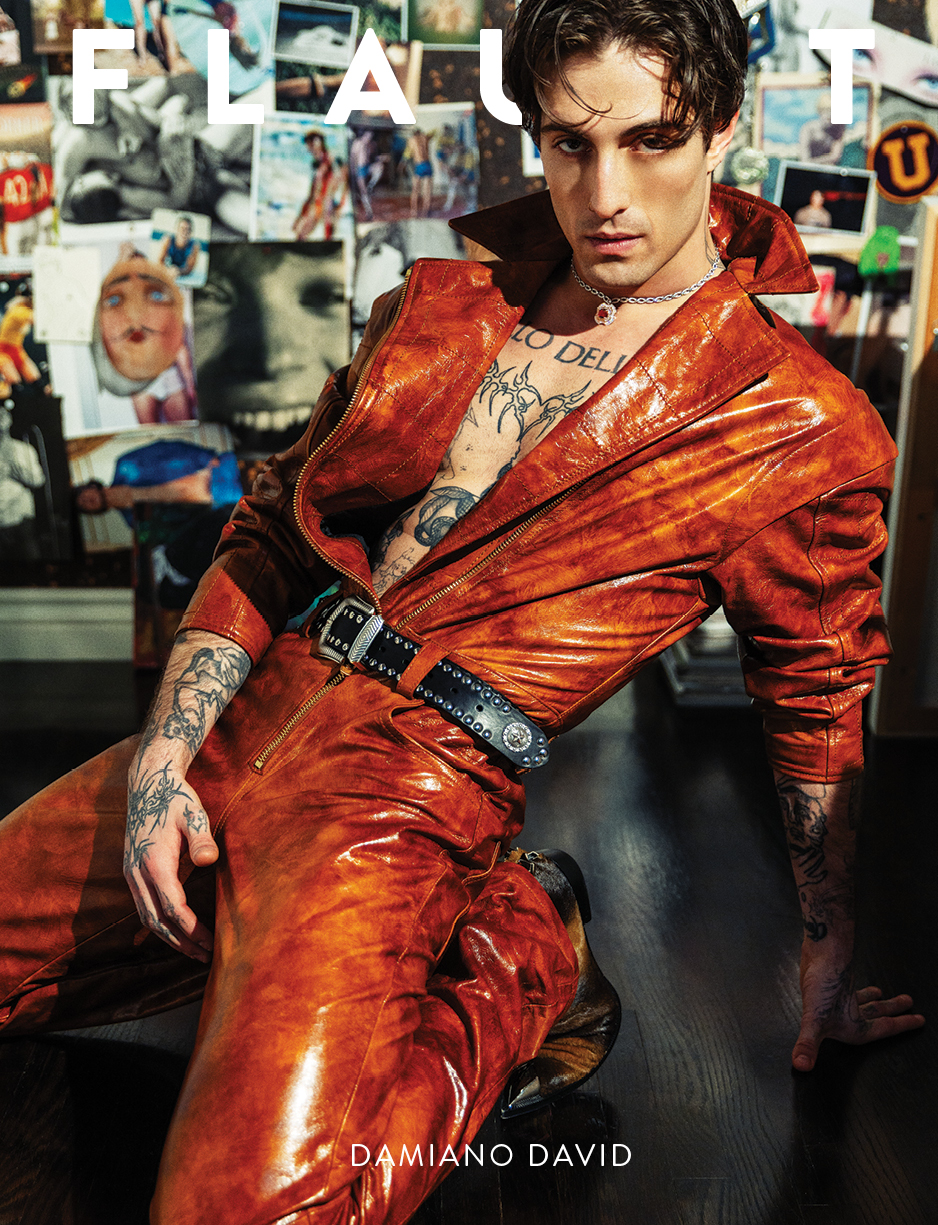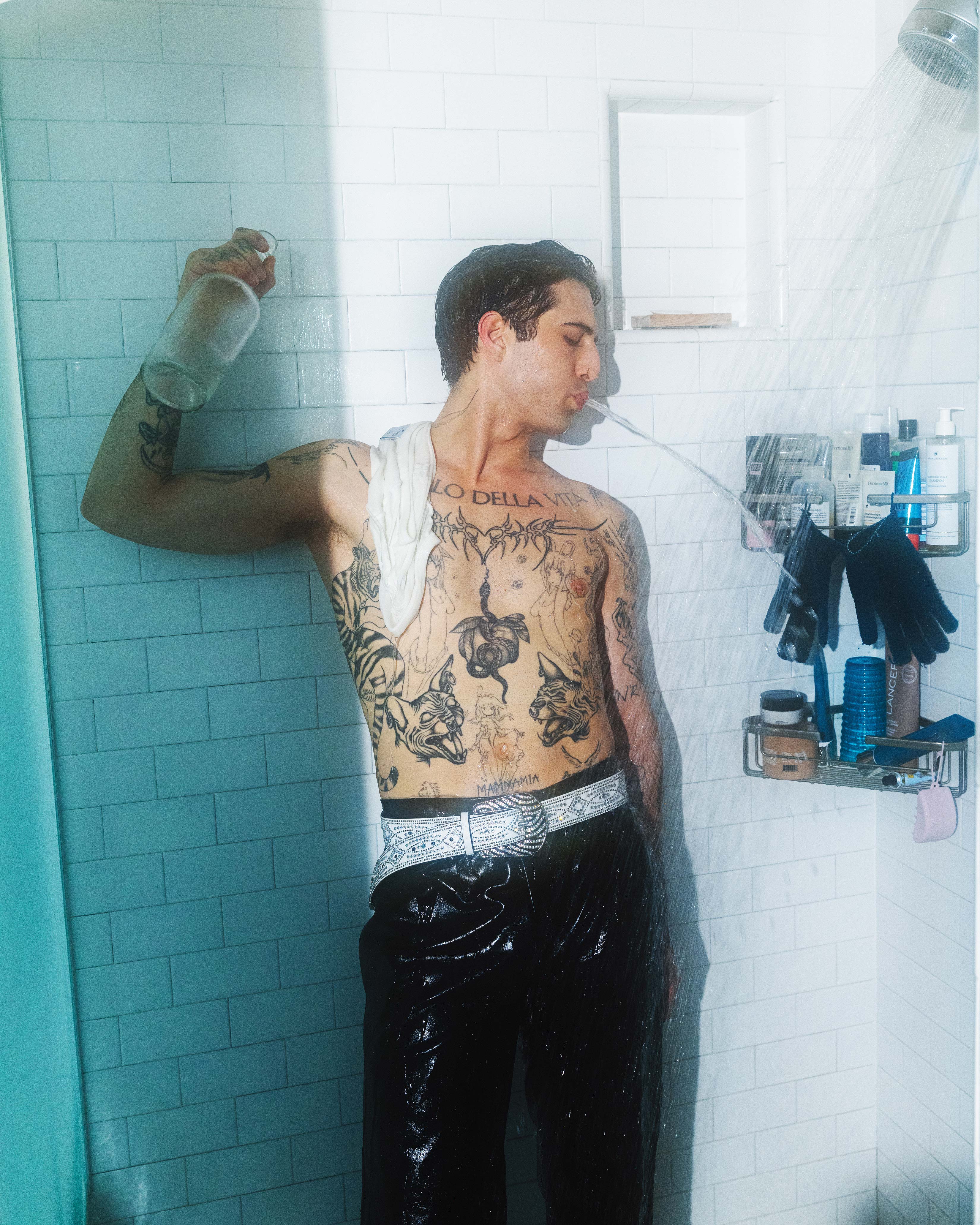F L A U N T


If you created a rock and roll star in a lab, the creature that emerged would likely resemble Damiano David. Picture it: dark, smart, soulful. Tattoos gliding across muscles, voice raspy and romantic, hair sculpted to perfection. Physicality and demeanor aside, the rock star in the public imaginary is still incomparable to the real deal. Damiano David, with brains and uncompromising morality, emerges from Rome under the Los Angeles sun and seems to ask: Are you not entertained?
Originally one part of the four piece band Måneskin, which took the world by storm most notably after winning the Eurovision Song Contest 2021 with hard-hitting anthem “Zitti e Buoni,” David is now gearing up for his first ever solo world tour for his debut solo album, FUNNY little FEARS. He’ll play five different continents on the tour, as well as appear on the festival circuit at Lollapalooza and Bonnaroo—many of these milestones he’s passed with Måneskin, but never solo.

As we speak about David’s adjustment period in the creative process, he eyes the palm trees dotting the LA skyline. He ponders, “With the band, it was always about throwing stuff in, and we tried to meet each other in a mid-way point. Whereas being solo, it is more about me digging into everything I have in my bag and seeing what I am more pulled to.” David continues, “I didn’t know what my solo style was going to be, but I knew that I had a couple of music genres that felt comfortable doing…I knew what my engine was, but I didn’t know where I was going to go, so I figured I was just going to try a bunch of things and see what I liked the most.”
David reveals that going solo has been both exciting and scary—it’s fresh territory for him. He has been playing and performing with Måneskin since they were teenagers in Rome, so the shift in his path sets a particularly strong precedent for his venture into an unknown realm.


“My bandmates are my friends and the only way I knew music so far,” he admits, “and they were also kind of my safety net, because every responsibility is shared, and you win or you lose together. Being solo is really a shot in the dark for me, not because I had crazy goals or ambitions for this record, but even just starting a process like this is very scary in the beginning, like I second-guessed myself on a lot of things. I found out that, like everything in life, the scarier part is the beginning, and then your body is going to tell you if that’s right or not, and after two days of sessions I already had basically three of the songs that are in the record now, so I had a pretty early signal that I was doing the right thing.”
FUNNY little FEARS feels like a contemplative journey into love and the deepest crevices of his subconscious. Take one of his recent singles off the album, “Next Summer,” where David is searching through his soul for the keys out of a prison of his own making. “The main issue [explored in] the song is this period of my life where I was holding onto this sad memory and I couldn’t let it go. It’s something that a lot of people do, like, holding onto the last remnant of something, even if it’s bad, because it’s the last connection that we have to that moment in our life.”

David sits, thinking. The fountain behind him splashes water for what seems like an eternity. Why do we hold onto things that don’t serve us? What are we trying to find in these strange people, places, and things?
“In my case, it was a romantic relationship,” David says, “but, I think, in general, we tend to do it pretty much with everything. Even the sentiment of nostalgia we have towards high school years or a first girlfriend. People—and I’m guilty of this too—tend to tie themselves to the worst things that happen in their lives rather than let it go.”
That being said, the essence of David’s “Born With a Broken Heart” may be contradictory to his creative process. He delights in health and fun, and takes enjoyment in the art of creation. “I don’t believe in the idea that you have to be sad to write good music—I think you actually have to be happy,” the rock star asserts. “If you’re going to talk about an issue in your life like somebody dying or breaking up or something major, I think that the only way to do it well is when you’re over it and healed, because you can look back at it and remember how you felt, but you have a critical sense of it, so you can really express a full thought rather than just puking your sadness on paper.”

Noted. Create after the fact. Makes sense for someone like David. After all, he has a keen eye and keen way of expressing himself. His music and vocal instrument move along with a distinct clarity and focus and strength. Listen to Måneskin’s cover of The Four Seasons song “Beggin’”—David tears through the ether like a love-lorn banshee. His wisdom as an artist and man are no mistake. It is born out of watching himself in a spiritual sense, and keeping track of what his truest desires are.
“I used to think that I wanted to be a kind of Mick Jagger figure,” David admits. “Like, I would be doing this for so long and always at the top level. I realized that that’s not really my thing. I decided that I’m going to let my personal life lead how my career is going to be, meaning that my main goal is to be healthy and happy and have a sense of life. For me, five years felt like they were actually two, and I feel like I missed so many steps and I could have done so many things a little bit slower.”


How does one do this with such a busy schedule? How does one ride the waves of fame, the waves of celebrity and success?
“I always remind myself that all of this is kind of not real,” David says. “Meaning that when I get on stage or when I’m doing an interview or when I’m on a red carpet, it’s not every day. It’s not normal. I don’t want it to be my normal, because I don’t want to get stuck in that sense of [being] larger-than-life that a lot of people fall into.”
He continues, reflective: “I think I’m very tied to normal things, simple things, like time with my family, my friends, my girlfriend, and having the sense of a house and a routine and a chance to take care of myself. I really don’t have to do much to accomplish this feeling, because I ignored it for such a long time that my body gives me very strong signals. I can quickly anticipate when something is going to be too much, or I don’t feel good doing something.”

This isn’t just talk. One can see the way David handles himself, moving with a kind of gentle ease. He’s a shape shifter of sorts; every time you see him he seems to be donning a completely different look—almost an entirely different atmosphere of being. One moment he looks to be channeling vintage Perry Farrell, the next he is channeling alternative version of early Jean-Paul Belmondo. We can only imagine that someone with such a chameleonic bent must be actually very secure and balanced inside, a balance that is paramount when traversing the music industry, a terrain so rife with uncertainty and expectation.
Thus, David stays confident in his beliefs.“If you don’t do something it’s not the end of the world,” he laughs. “The industry feeds us this [idea] that if you miss a train it’s the last train. And I believed that, but then I realized: I’m fucking 26 and I can take it a little easier. I only know this because I experienced it, and I don’t judge younger artists when I see them believing that, and I empathize with them because I did it myself, I totally denied my personal life to achieve awards and chart positioning and I overworked myself and I lived out of a suitcase for five years of my life.”

David speaks passionately of his friends and girlfriend and the company he keeps when it comes to work—entities that keep his trajectory and life in healthy balance. Although his work is now becoming a solo offering, what goes on behind the scenes is very much a tribe for him. Each part creating an environment for David to thrive and make his best work.

When asked about something he tries to release from his past, or, at least, honor, David takes a moment of silence to remember his family, and an early memory surfaces: “My brother had more say in family issues and decisions, so I kind of always had this thing: I have to establish myself and make myself as big as possible in the room, and make sure that people are listening to me. I think that was kind of the toxic part of why I wanted to be a musician, because then people are going to be forced to listen to me,” David pauses, laughs. “I think what FUNNY little FEARS is doing for me is really letting go of that, because I’m really not concerned of how much success this record is going to get—it’s really for me to be satisfied, and to look back at what I did and to be proud of it and not have any regret or any leftover thing that I wanted to say.”

Photographed by Doug Inglish
Styled by Michele Potenza
Written by Augustus Britton
Grooming: Mira Hyde at Asm Management
Flaunt Film Editor and Music: Daniel Quintero
Videography: Ethan Schlesinger
Styling Assistant: Annie Leaston